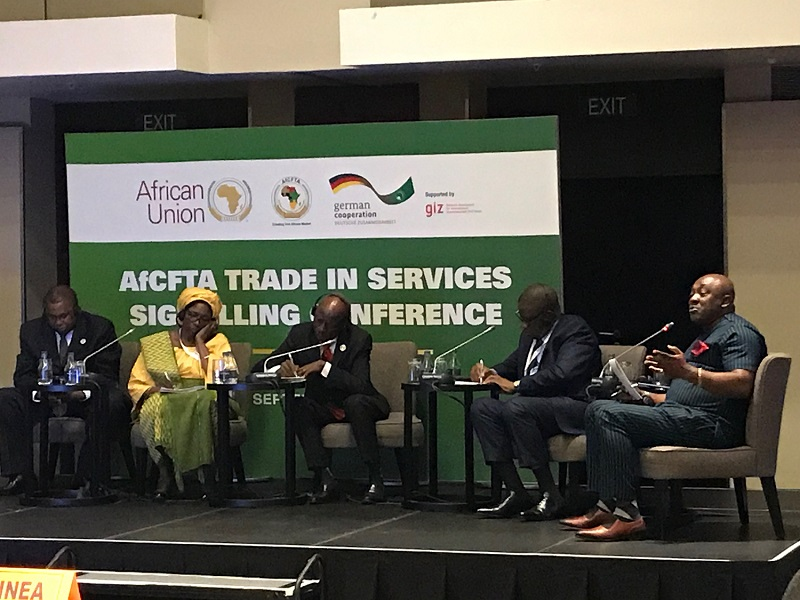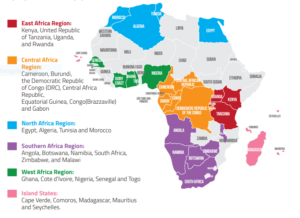
Africa’s Services Sector is Growing, Prioritize AfCFTA’s Trade in Services Protocol in 2024
A Year of Gainful Milestones
The African Continental Free Trade Area (AfCFTA) agreement saw significant gains in 2023 creating significant hope around the operationalization of the framework and making of inroads towards the realization of a single continental market. As a flagship project of the African Union, the framework is geared at eliminating trade barriers in Africa, boosting intra-Africa trade, boosting trade by $450 billion by 2035, and listing about 30 million people out of extreme poverty. Significant gains have o been made in adopting protocols in Trade in Goods, Trade in Services, Competition Policy, Investment, and Intellectual property rights, and the harmonization of customs procedures and standards boost trade and investment across Africa. However, limited efforts and gains have been dedicated towards the Trade in Services protocol compared to the Trade in Goods element highlighting the need for renewed efforts.
At the launch of the Guided Trade Initiative in 2022, a solution-based approach designed for matchmaking businesses and products for export and import between interested states, there were only 7 participating countries. In 2023, the GTI expanded in both product and country coverage to 31 state parties with the development of programs for stakeholder engagement to materialize trade benefits and introduce the concept of AfCFTA trading companies. However, the progress has been largely one-sided with an increased emphasis on the Trade in Goods at the expense of the services sector. This was for instance marked by the issuance of an AfCFTA Certificate of Origin (CoO) by Tanzania for coffee shipment to Algeria and Tunisia for export of Chemicals to Cameroon.
Trade in Services Protocol
The less emphasized element of the Guided Trade Initiative is a key component in the AfCFTA aspirations and seeks to create a single liberalized market for trade in services. Thus, the protocol, which entered into force in 2019 established rules for liberalizing trade in services between state parties. It is designed to boost intra-African trade around four modes of supply, including cross-border supply, consumption abroad, commercial presence, and enhancing temporary movement of natural persons.

The protocol agreed to have state parties expand the depth and scope of services trade liberalization, and increase, improve and develop export services. The earmarked priority areas include tourism services, transport services, financial services, business services, and communication services. With a combined effort in the liberalization of trade in services, in addition to trade in goods, across the continent, enhanced domestic and foreign investment can be enhanced with enhanced cooperation among state parties.
Urgency in Fast Tracking Trade in Service Protocol
Even as the AfCFTA encourages more countries to participate in the guided trade initiative to drive cross-border trade, the fast-tracking of commitments in the adopted schedules to start trading in services is a matter of urgency. The implementation of the protocol is key in enhancing a seamless flow of services across African borders and therefore plays a crucial role in driving economic growth. Additionally, this can be expected to open up new job opportunities, create unprecedented levels of market access, and create a way for enhanced innovation and efficiency across the continent.
“In 2024 therefore, the AfCFTA secretariat has to focus on facilitating the implementation of commitments in the adopted schedules to facilitate commencement of trade in services in the AfCFTA, over a year later.”
The AfCFTA secretariat has to recognize the role of the growing trade sector in the continent which represents an estimated 53% of the aggregated Gross Domestic Product (GDP) in Africa relative to the industrial sector which accounts for about 36%. The sector has been characterized by an increase in the share of employment to 42.36% in 2021 signifying its potential in defining the continent’s value and wealth creation. However, in real productivity terms, Africa’s service sector lags at $72000 as of 2019 compared to $8,900 in India, $20,900 in China, and $17,700 in Latin America. Thus, in addition to the goods sector, the AfCFTA must double its efforts in improving the productivity of the service sector. Enhanced efforts in the sector are a catalyst for the AfCFTA’s efforts in leveling the playing field by offering businesses of all sizes a platform to participate in continental trade.
Thus, while the protocol has established 22 state-party schedules, a legal foundation, a practical guide for service providers and private-sector stakeholders, and drafting of regulatory frameworks for key considered sub-sectors, fast-tracking on the implementation phase remains inconspicuous. In 2024 therefore, the AfCFTA secretariat has to focus on facilitating the implementation of commitments in the adopted schedules to facilitate commencement of trade in services in the AfCFTA, over a year later.
Shaping the Guided Trade Initiative for Trade in Services
The challenge for the AfCFTA in matching the protocol efforts with that of Trade in Goods means ensuring that the commitments in the various commitments are urgently and effectively implemented by state parties. This will enable the timely commencement of trade in services and enhance the growth of the sector in contributing to economic development and job creation. Secondly, capacity building for the development of the sector is also needed. In collaboration with state parties and the private sector, the AfCFTA in 2024 has a role to play in showcasing new market openings and the development of a conducive environment, as per the transparency and market access commitment of the schedule, to attract both foreign and domestic investments in the sector.
Moreover, state agencies and the private sector require the AfCFTA, as is with the trade in goods protocol, support for the implementation of underlined commitments, and leveraging opportunities within the sector. This is a critical element in enhancing participation, by both large corporations and small and medium-sized enterprises, in the guided trade initiative phase through access to information on the sector. This will therefore call for enhanced dialogues and collaborations between various stakeholders to ensure the consideration of the interests and concerns of all parties. Moreover, effective processes for monitoring and evaluation need to be adopted to ensure the actualization of the aspiration and enhance future convergences.



